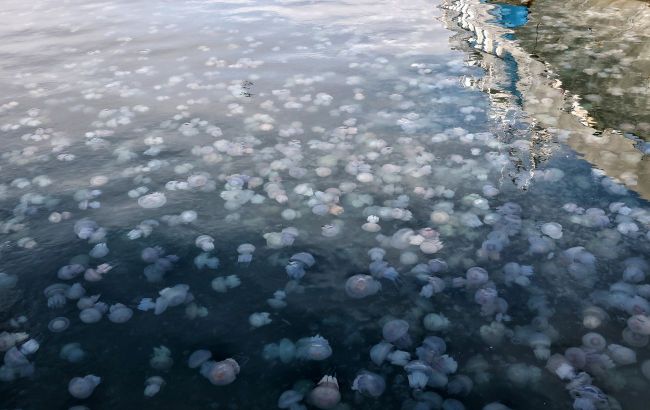Azov Sea overwhelmed by jellyfish: Occupation's role in looming ecological collapse
 Jellyfish are attacking the Azov Sea (photo: Getty Images)
Jellyfish are attacking the Azov Sea (photo: Getty Images)
On the shores of the Azov Sea, a sharp increase in the number of jellyfish has been observed, making it practically impossible to relax in the coastal waters. The cause of this phenomenon is the ecological consequences of Russia's full-scale war against Ukraine and the irresponsible actions of the occupation administrations, reports the Center for Countering Disinformation.
Due to the war, the chemical composition of the sea has changed
In particular, due to the hostilities, the Seversky Donets-Donbas canal, which provided fresh water to the Azov Sea, was damaged. As a result, the salinity of the water in the sea increased sharply, creating favorable conditions for the rapid spread of jellyfish.
Vacation on the Azov coastline is under threat
The sharp increase in jellyfish has made swimming in the sea dangerous and unpleasant. Environmentalists warn that the situation is increasingly approaching an ecological disaster.
Instead of taking measures to try to reduce the ecological damage, the Russian occupation authorities, according to the Center for Countering Disinformation, are shifting the blame for the condition of the Azov Sea onto Ukraine.

Occupiers' actions have brought the Azov Sea closer to ecological disaster (screenshot)
Mass fish die-off
The situation is further complicated by the active fish catch by the occupation administration, as well as the discharge of polluted wastewater. This has already led to the actual destruction of the population of goby fish, one of the most common fish species in the Azov Sea. There is also a die-off of other species.
It is worth noting that in the spring of this year, a mass fish die-off was recorded in occupied Mariupol, and hundreds of dead crabs were washed ashore near Kerch. This may be a result of an oil spill from Russian tankers in the Kerch Strait in December 2024.
The occupying authorities are ignoring the ecological problems of the Azov Sea, while propagandists boast of record shrimp catches. However, they conceal the fact that the shrimp population has increased due to the rise in water salinity. In the long term, this points to the degradation of the unique ecosystem.
Earlier, we reported that in mid-December, after an accident with tankers, oil was spilled in the Kerch Strait. About a month later, it reached the Ukrainian shores of the Azov Sea. Satellite images captured an oil slick near the occupied Berdiansk

